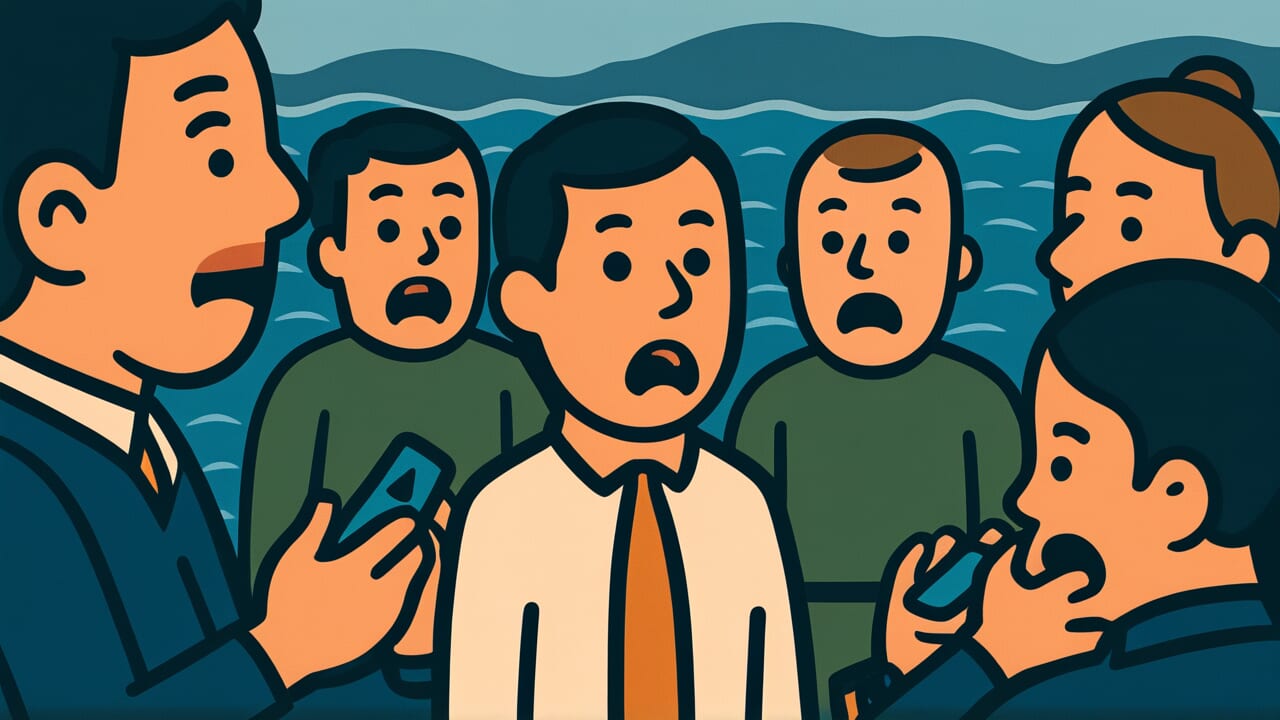How to Read “Blocking the mouths of the people is worse than blocking a river”
Tami no kuchi wo fusegu wa kawa wo fusegu yori mo hanahada shi
Meaning of “Blocking the mouths of the people is worse than blocking a river”
This proverb means that trying to silence people’s voices by force is more difficult and dangerous than trying to block a river’s flow.
When you suppress people’s complaints and opinions, things may seem quiet on the surface. But in reality, enormous energy builds up inside.
It’s just like trying to stop water with a dam. Eventually it breaks and causes a huge disaster.
This proverb is mainly used as a warning to people in power. It applies when organizational leaders or managers refuse to listen to their subordinates and try to shut down criticism.
By comparing the danger of taking away free speech to the terrifying power of rivers, it makes the seriousness very clear.
Even in modern society, this saying teaches us the importance of creating environments where people can freely express their opinions. This is essential for healthy organizations and societies.
Origin and Etymology
This proverb is believed to come from a story recorded in the ancient Chinese text “Guoyu” (Discourses of the States).
In 841 BCE, King Li of Zhou feared criticism from the people. He implemented policies to control speech. People became so afraid that when they met on the street, they only communicated with their eyes.
A minister named Duke Shao worried about this situation. He advised the king: “Blocking the mouths of the people is worse than blocking a river.”
If you forcibly dam a river’s flow, it will eventually break through and cause great disaster. Similarly, if you silence people’s voices by force, their discontent keeps building inside.
One day it will explode into rebellion and destroy the nation. Just as managing rivers requires letting water flow through, governing a country requires listening to people’s voices.
However, King Li did not accept this advice. Three years later, the people’s anger finally exploded. The king was driven out of the country.
This historical lesson was passed down to Japan as a warning to rulers. It became established as a proverb teaching the importance of free speech.
Usage Examples
- The company kept ignoring employee complaints, and talented people quit one after another. It’s exactly “Blocking the mouths of the people is worse than blocking a river.”
- If schools don’t listen to students’ voices, it’s like “Blocking the mouths of the people is worse than blocking a river.” Eventually a big problem will happen.
Universal Wisdom
The deepest truth this proverb reveals is that human expression is an unstoppable instinct. Everyone has a fundamental desire to express their thoughts and feelings.
This desire is as strong as any physical need.
Why has this proverb been passed down for thousands of years? Because people in power have repeatedly made the same mistake.
When people gain power, they dislike criticism. They want to eliminate dissent. But history proves that such attempts always fail.
The river metaphor is brilliant because water’s nature is remarkably similar to human speech. Water flows from high places to low places.
When it meets obstacles, it goes around them. When completely blocked, it builds pressure and breaks through.
Human words work the same way. If people can’t speak openly, they whisper in private. If that’s also blocked, they scream inside their hearts.
Eventually it erupts as explosive energy.
Our ancestors understood this truth. The secret to maintaining a healthy society is not suppression but circulation.
Creating space for all voices to flow, including complaints and criticism, is what brings true stability.
When AI Hears This
The second law of thermodynamics teaches that disorder always increases in a closed system. When you think about speech control through thermodynamics, a fascinating structure emerges.
People’s complaints and opinions are like “thermal energy” in physics. In normal conditions, they’re gradually released through conversation and discussion.
For example, when you complain about work to a friend, small frustrations are dispersed daily. This functions as an open system.
But speech control forcibly closes this system. Like putting a lid on a pressure cooker, there’s no escape for the energy.
What’s important here is that even though control appears to maintain “order” on the surface, entropy steadily accumulates inside the system.
As a physical law, this accumulation cannot be stopped. Just as damming a river increases water pressure, blocking speech causes internal social pressure to rise exponentially.
The moment it exceeds the critical point, the same phenomenon as a dam breaking occurs. Water that would be manageable flowing gradually becomes uncontrollable when released all at once.
The stricter the control, the greater the accumulated entropy. The final collapse energy becomes enormous too.
This is the paradox of blocking that thermodynamics reveals.
Lessons for Today
What this proverb teaches modern people is that voices that hurt your ears have the most value. We all find criticism and opposing opinions painful to hear.
But the moment you try to push away those uncomfortable voices is the most dangerous turning point.
Whether at home or work, it’s crucial to create environments where “hard things to say” can be said. Families where children can’t speak honestly to parents, workplaces where subordinates can’t voice opinions to bosses—they may look peaceful on the surface.
But inside, something is definitely breaking down.
If you’re in a position above others, have the courage to welcome criticism. That’s not weakness but true strength.
And if you’re in a position where it’s hard to speak up, don’t give up. Keep trying to make your voice heard in appropriate ways at appropriate times.
A healthy society is a place where diverse voices resonate together. Each person’s voice is a water drop that makes the river of society flow richly.
Your voice truly has value.



Comments